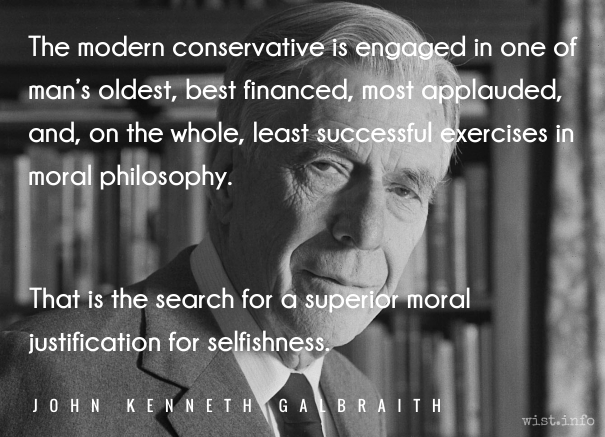Most people imagine that the rich are in heaven, but, as a rule, it is only a gilded hell. There is not a man in the city of New York with genius enough, with brains enough, to own five millions of dollars. Why? The money will own him. He becomes the key to a safe. That money will get him up at daylight; that money will separate him from his friends; that money will fill his heart with fear; that money will rob his days of sunshine and his nights of pleasant dreams. He cannot own it. He becomes the property of that money. And he goes right on making more. What for? He does not know. It becomes a kind of insanity. No one is happier in a palace than in a cabin.
Quotations about:
greed
Note not all quotations have been tagged, so Search may find additional quotes on this topic.
The modern conservative is not even especially modern. He is engaged, on the contrary, in one of man’s oldest, best financed, most applauded, and, on the whole, least successful exercises in moral philosophy. That is the search for a superior moral justification for selfishness. It is an exercise which always involves a certain number of internal contradictions and even a few absurdities. The conspicuously wealthy turn up urging the character-building value of privation for the poor. The man who has struck it rich in minerals, oil, or other bounties of nature is found explaining the debilitating effect of unearned income from the state. The corporate executive who is a superlative success as an organization man weighs in on the evils of bureaucracy. Federal aid to education is feared by those who live in suburbs that could easily forgo this danger, and by people whose children are in public schools. Socialized medicine is condemned by men emerging from Walter Reed Hospital. Social Security is viewed with alarm by those who have the comfortable cushion of an inherited income. Those who are immediately threatened by public efforts to meet their needs — whether widows, small farmers, hospitalized veterans, or the unemployed — are almost always oblivious to the danger.
John Kenneth Galbraith (1908-2006) Canadian-American economist, diplomat, author
Speech (1963-12-13), “Wealth and Poverty,” National Policy Committee on Pockets of Poverty
(Source)
Galbraith used variations on this quote over the years.
- The above quotation was from a speech given, that was then entered into the Congressional Record, Vol. 109, Senate (1963-12-18).
- This material was reworked into an article "Let us begin: An invitation to action on poverty," in Harper's (1964-03), which was in turn again entered into the Congressional Record, Vol. 110 (1964).
- One of the last is most often cited: "The modern conservative is engaged in one of man’s oldest exercises in moral philosophy, that is the search for a superior moral justification for selfishness. It is an exercise which always involves a certain number of internal contradictions and even a few absurdities. The conspicuously wealthy turn up urging the character-building value of privation for the poor." ["Stop the Madness," Interview with Rupert Cornwell, Toronto Globe and Mail (2002-07-06)]
If ye love wealth better than liberty, the tranquility of servitude than the animated contest of freedom — go home from us in peace. We ask not your counsels or arms. Crouch down and lick the hands which feed you. May your chains sit lightly upon you, and may posterity forget that you were our countrymen!
Samuel Adams (1722-1803) American revolutionary, statesman
Speech, State House, Philadelphia (1776-08-01)
(Source)
We have always known that heedless self-interest was bad morals; we know now that it is bad economics.
Franklin Delano Roosevelt (1882-1945) American lawyer, politician, statesman, US President (1933-1945)
Inaugural Address (20 Jan 1937)
(Source)
The man of honor thinks of his character, the inferior man of his position. The man of honor desires justice, the inferior man favor.
[君子懷德、小人懷土、君子懷刑、小人懷惠。]
Confucius (c. 551- c. 479 BC) Chinese philosopher, sage, politician [孔夫子 (Kǒng Fūzǐ, K'ung Fu-tzu, K'ung Fu Tse), 孔子 (Kǒngzǐ, Chungni), 孔丘 (Kǒng Qiū, K'ung Ch'iu)]
The Analects [論語, 论语, Lúnyǔ], Book 4, verse 11 (4.11) (6th C. BC – AD 3rd C.) [tr. Soothill (1910)]
(Source)
(Source (Chinese)). Alternate translations:
The superior man thinks of virtue; the small man thinks of comfort. The superior man thinks of the sanctions of law; the small man thinks of favours which he may receive.
[tr. Legge (1861)]
The masterly man has an eye to virtue, the common man, to earthly things; the former has an eye to penalties (for error), the latter, to favour.
[tr. Jennings (1895)]
A wise man regards the moral worth of a man; a fool, only his position. A wise man expects justice; a fool expects favours.
[tr. Ku Hung-Ming (1898)]
The proper man is concerned with examining his consciousness and acting on it, the small man is concerned about land; the superior man about legality, the small man about favors.
[tr. Pound (1933)]
Where gentlemen set their hearts upon moral force (tê), the commoners set theirs upon the soil. Where gentlemen think only of punishments, the commoners think only of exceptions.
[tr. Waley (1938)]
The perfect gentleman cherishes high moral conduct; the mean man, well-being. The perfect gentleman cherishes the penal code; the mean man, ex¬ emptions therefrom.
[tr. Ware (1950)]
While the gentleman cherishes benign rule, the small man cherishes his native land. While the gentleman cherishes a respect for the law, the small man cherishes generous treatment.
[tr. Lau (1979)]
The gentleman cherishes virtue, but the small man cherishes the soil; the gentleman cherishes the rigors of the law, but the small man cherishes leniency.
[tr. Dawson (1993)]
A gentleman seeks virtue; a small man seeks land. A gentleman seeks justice; a small man seeks favors.
[tr. Leys (1997)]
The gentleman cherishes virtue; the small man cherishes land. The gentleman cherishes institutions; the small man cherishes favors.
[tr. Huang (1997)]
The gentlemen are concerned about the virtuousness; the mean persons are concerned about the land. The gentlemen are concerned about the status; the mean persons are concerned about the benefit.
[tr. Cai/Yu (1998), #77]
Exemplary persons (junzi) cherish their excellence; petty persons cherish their land. Exemplary persons cherish fairness; petty persons cherish the thought of gain.
[tr. Ames/Rosemont (1998)]
The gentleman likes virtue; the little man likes partiality. The gentleman likes justice; the little man likes mercy.
[tr. Brooks/Brooks (1998)]
while the noble-minded cherish integrity, little people cherish territory. And while the noble-minded cherish laws, little people cherish privilege.
[tr. Hinton (1998)]
The gentleman cherishes virtue, whereas the petty person cherishes physical possessions. The gentleman thinks about punishments, whereas the petty person thinks about exemptions.
[tr. Slingerland (2003)]
The gentleman has his mind fixed on virtue; the petty man has his mind fixed on land. The gentleman has his mind fixed on penalties; the petty man has his mind fixed on bounty.
[tr. Watson (2007)]
The gentleman [junzi] worries about the condition of his moral character, while the common man [xiaoren] worries about [whether he can hold on to] his land. The gentleman is conscious of [not breaking] the law, while the common man is conscious of what benefits he might reap [from the state].
[tr. Chin (2014)]
A Jun Zi cares about virtuous and righteous principles, whereas a Xiao Ren cares about worldly matters. A Jun Zi cares about rules and discipline, whereas a Xiao Ren cares about benefits.
[tr. Li (2020)]
The superior man seeks what is right; the inferior one, what is profitable.
[Source]
Those two fatal words, Mine and Thine.
Miguel de Cervantes (1547-1616) Spanish novelist
Don Quixote, Part 1, Book 2, ch. 11 (1605) [tr. Motteux & Ozell (1743)]
(Source)
Alt trans.:
- "Oh happy age, which our first parents called the age of gold! not because gold, so much adored in this iron-age, was then easily purchased, but because those two fatal words, mine and thine, were distinctions unknown to the people of those fortunate times." [Full version of the above]
- "Happy the age, happy the time, to which the ancients gave the name of golden, not because in that fortunate age the gold so coveted in this our iron one was gained without toil, but because they that lived in it knew not the two words 'mine' and 'thine'!" [tr. Ormsby (1885)]
- "Happy age, and happy days were those, to which the ancients gave the name of golden; not, that gold, which in these our iron-times, is so much esteemed, was to be acquired without trouble, in that fortunate period; but, because people then, were ignorant of those two words MINE and THINE." [tr. Smollett (1976), as Part 1, Book 1, ch. 3]
The poor one is not the man who has little, but the man who craves more.
[Non qui parum habet, sed qui plus cupit, pauper est.]
Seneca the Younger (c. 4 BC-AD 65) Roman statesman, philosopher, playwright [Lucius Annaeus Seneca]
Moral Letters to Lucilius [Epistulae morales ad Lucilium], letter 2 “On Discursiveness in Reading,” sec. 6
Alt trans. (Gummere (1918)): "It is not the man who has too little, but the man who craves more, that is poor."












